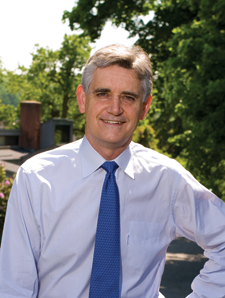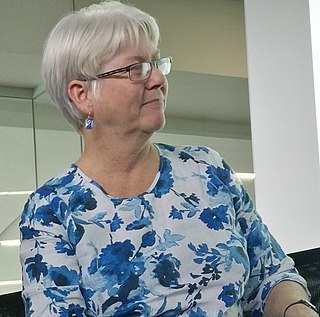Nancy Fannie Millis was an Australian microbiologist and Emeritus Professor who introduced fermentation technologies to Australia, and created the first applied microbiology course taught in an Australian university.
Adrienne Elizabeth Clarke is professor emeritus of Botany at the University of Melbourne, where she ran the Plant Cell Biology Research Centre from 1982 to 1999. She is a former chairman of the Commonwealth Scientific and Industrial Research Organisation, former Lieutenant Governor of Victoria (1997–2000) and former Chancellor of La Trobe University (2011–2017).
Suzanne Cory is an Australian molecular biologist. She has worked on the genetics of the immune system and cancer and has lobbied her country to invest in science. She is married to fellow scientist Jerry Adams, also a WEHI scientist, whom she met while studying for her PhD at the University of Cambridge, England.
Marshall (Hal) Davidson Hatch AM (born 24 December 1932) was an Australian biochemist and plant physiologist. He was the chief research scientist at the CSIRO Division of Plant Industry in Canberra. He is a Fellow of the Australian Academy of Science, a Fellow of the Royal Society, a Foreign Associate of the US National Academy of Sciences and was awarded Honorary Doctorates from the University of Göttingen and the University of Queensland. In Australia, in 1966, he elucidated, jointly with Charles Roger Slack, the C4 pathway for the fixation of carbon, which is also sometimes known as the Hatch-Slack pathway. He is now retired.

Joan Mary "Jan" Anderson FAA FRS was a New Zealand scientist who worked in Canberra, Australia, distinguished by her investigation of photosynthesis.
Marilyn Lee Lake, is an Australian historian known for her work on the effects of the military and war on Australian civil society, the political history of Australian women and Australian racism including the White Australia Policy and the movement for Aboriginal and Torres Strait Islander human rights. She was awarded a personal chair in history at La Trobe University in 1994. She has been elected a Fellow, Australian Academy of the Humanities and a Fellow, Academy of the Social Sciences in Australia.

Bruce William Stillman, AO, FAA, FRS is a biochemist and cancer researcher who has served as the Director of Cold Spring Harbor Laboratory (CSHL) since 1994 and President since 2003. He also served as the Director of its NCI-designated Cancer Center for 25 years from 1992 to 2016. During his leadership, CSHL has been ranked as the No. 1 institution in molecular biology and genetics research by Thomson Reuters. Stillman's research focuses on how chromosomes are duplicated in human cells and in yeast Saccharomyces cerevisiae; the mechanisms that ensure accurate inheritance of genetic material from one generation to the next; and how missteps in this process lead to cancer. For his accomplishments, Stillman has received numerous awards, including the Alfred P. Sloan, Jr. Prize in 2004 and the 2010 Louisa Gross Horwitz Prize, both of which he shared with Thomas J. Kelly of Memorial Sloan-Kettering Cancer Center, as well as the 2019 Canada Gairdner International Award for biomedical research, which he shared with John Diffley.
Norman "Keith" Boardman AO FAA FRS is an Australian biochemist. He was elected Fellow of the Australian Academy of Science in 1972.
Emma Whitelaw is an eminent molecular biologist and NHMRC Australia Fellow at the Queensland Institute of Medical Research and is among Australia's leading researchers of epigenetics. Whitelaw was the first to demonstrate epigenetic inheritance in mammals. She now currently works at La Trobe University in Australia.
Richard Simpson is a professor in the department of biochemistry at La Trobe University. He is the inaugural and current president of the Australasian Proteomics Society and a past treasurer of the Human Proteome Organization. Simpson was elected Honorary Member of the American Society of Biochemistry and Molecular Biology in 1996, awarded the AMRAD Pharmacia Medal from the Australian Society for Biochemistry & Molecular Biology, and was an elected councillor of the Protein Society (1993-1996). In 1995, Simpson was elected Fellow of the Australian Academy of Technological Sciences and Engineering and in 2001 was awarded the Centenary Medal "For service to Australian society in research and development".
Jennifer Ann Marshall Graves is an Australian geneticist. She is Distinguished Professor within the La Trobe Institute for Molecular Science, La Trobe University, Australia and Professor Emeritus of the Australian National University.
Marilyn Bernice Renfree is an Australian zoologist. She completed her PhD at the Australian National University, was a post-doctoral fellow in Tennessee and then Edinburgh before returning to Australia. Since 1991, Renfree has been Professor of Zoology at the University of Melbourne. Her main research interest focuses on reproductive and developmental biology of marsupials.
Pauline Yvonne Ladiges is a botanist whose contributions have been significant both in building the field of taxonomy, ecology and historical biogeography of Australian plants, particularly Eucalypts and flora, and in science education at all levels. She is professorial fellow in the School of Botany at the University of Melbourne, where she has previously held a personal chair and was head of the School of Botany at the University of Melbourne from 1992 to 2010. She has been a fellow of the Australian Academy of Science since 2002. The standard author abbreviation Ladiges is used to indicate this person as the author when citing a botanical name.

Leann Tilley is Professor of Biochemistry and Molecular Biology in the Bio21 Molecular Science and Biotechnology Institute, The University of Melbourne.

The La Trobe Institute for Molecular Science (LIMS) is an Australian institute based at La Trobe University in Melbourne. It contains research groups in life sciences, physical sciences, and applied sciences (pharmacy) and teaches undergraduate and graduate courses in these areas through the School of Molecular Sciences. Established in 2009, the institute has been led by Professor Andrew Hill since 2017.
Peter Bordier Høj is a Danish-Australian academic and Vice-Chancellor and President of the University of Adelaide. Peter Høj is one of the longest serving Australian Vice-Chancellors having served for 16 years across three universities. He has previously served as Vice-Chancellor and President of the University of Queensland and the University of South Australia. Educated at the University of Copenhagen, Høj completed a Bachelor of Science where he majored in biochemistry and chemistry, a Master of Science in biochemistry and genetics and a Doctor of Philosophy in Photosynthesis. He has worked in Denmark and Australia as a researcher and published multiple scientific articles. Høj has also served on a number of different company boards in a variety of roles, including current roles on the boards of CSIRO, Wine Australia and of the Australian Cancer Research Foundation. In 2017 he was elected chair of the Group of Eight, a lobby group that represents Australia’s research-intensive universities. He was the vice-chancellor of the University of Queensland from 2012-2020.
Joy Damousi, is an Australian historian and Professor and Director of the Institute for Humanities and Social Sciences at Australian Catholic University. She was Professor of History in the School of Historical and Philosophical Studies at the University of Melbourne for most of her career, and retains a fractional appointment. She was the President of the Australian Academy of the Humanities from 2017 to 2020.
Margot Ruth Prior was an Australian psychologist, educator, and musician. She was professor of psychology at the University of Melbourne where her research focussed on autism and literacy development. She was also director of psychology at the Royal Children's Hospital and was adjunct professor at La Trobe University.

Erinna Lee is a Singaporean molecular biologist specializing in apoptosis and autophagy.
Ian Phillip Anderson, is an Australian academic and senior public servant.




